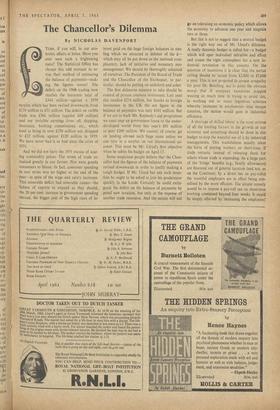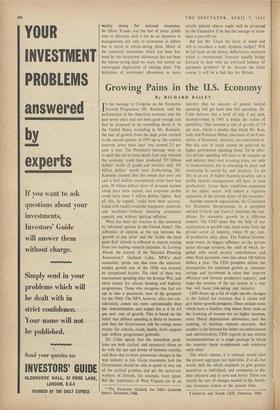The Chancellor's Dilemma
By NICHOLAS DAVENPORT
TURN, if you will, to our eco- nomic affairs at home. Have you ever seen such a frightening mess? The Statistical Office has chosen this odd moment to re- vise their method of estimating the balance of payments—mak- ing the figures worse! The deficit on the 1960 trading now reaches the fearsome total of £344 million—against a 1959 surplus which has been revised downwards from £139 million to £51 million. The deficit on visible trade was £366 million (against £69 million) and our invisible earnings from oil, shipping, insurance, banking commissions, etc., which used to bring in over £250 million net, dropped to £22 million, against £120 million in 1959.
We have never had it so bad since the crisis of 1951.
And we did not have the 1951 excuse of soar- ing commodity prices. The terms of trade re- mained greatly in our favour. Nor were greedy consumers to blame. In fact, consumer spending in real terms was no higher at the end of the Year—in spite of the wage and salary increases. This miserable deficit had miserable causes—the failure of exports to expand as they should, the 20 per cent. increase in government spending abroad, the bigger cost of the high rates of in- terest paid on the huge foreign balances in ster- ling which we attracted in defence of the Li— which may all be put down to the national com- placency, lack of initiative and monetary mis- management. We should be thoroughly ashamed of ourselves. The President of the Board of Trade and the Chancellor of the Exchequer, in par- ticular, should be putting on sackcloth and ashes.
The first defensive measure to take should be control of private overseas investment. Last year this totalled £274 million, but thanks to foreign investment in the UK the net figure in the balance of payments was only £101 million. But if we are to back Mr. Kennedy's aid programme we must step up government loans to the under- developed world from last year's £91 million to near £200 million. We cannot, of course, go on lending abroad such huge sums unless we can turn in a surplus on our international ac- count. This must be Mr. Lloyd's first objective when he tables his budget on April 17.
Some suspicious people believe that the Chan- cellor had the figures of the balance of payments revised downwards in order to justify making a tough budget. If Mr. Lloyd has any such inten- tion he ought to be asked to join his predecessor quickly in the Lords. Certainly he could extin- guish the deficit on the balance of payments by penal new taxation, but only at the expense of another trade recession. And the nation will not go on tolerating an economic policy which allows the economy to advance one year and stagnate two or three.
But this is not to suggest that a neutral budget is the right way out of Mr. Lloyd's dilemma- A really dynamic budget is called for—a budget which will spur individual initiative and effort and create the right atmosphere for a new in- dustrial revolution in this country. On the question of incentives it is clear that the surtax ceiling should be raised from £2,000 to £5,000 a year. This is not proposed to arouse sympathy for poor Dr. Beeching, but to point the obvious moral—that if company executives stopped wasting so much time in trying to avoid tax, in working out so many ingenious schemes whereby increases in emoluments may escape taxation, the nation would gain in industrial efficiency.
A shortage of skilled labour is the most serious of all the limiting factors in the growth of our economy and something should be done in this budget to stop the wasteful use of it by industrial managements. This wastefulness usually takes the form of putting workers on short-time, if trade retracts, instead of releasing them for others whose trade is expanding. As a large part of the 'fringe' benefits (e.g., family allowances) are financed out of general taxation (and not, as on the Continent, by a direct tax on pay-rolls) the wasteful employers are in effect being sub- sidised by the more efficient. The simple remedy would be to impose a pay-roll tax on short-time working continued beyond four weeks. It could be simply effected by increasing the employers' weekly stamp for national insurance. Sir Oliver Franks was the last of many public men to advocate such a tax as an incentive to managements not only to economise in labour but to invest in labour-saving plant. Much of the industrial investment which has been fos- tered by the investment allowances has not been the labour-saving kind we want, but merely an extravagant duplication of existing plant. The limitation of investment allowances to more strictly defined objects might well be proposed by the Chancellor if he has the courage to intro- duce a pay-roll tax.
But has Mr. Lloyd the force of mind and will to introduce a really dynamic budget? Will he fall back on the dreary, deflationary measures which a conventional Treasury usually brings forward to deal with an awkward balance of payments problem? If he chooses the latter course, it will be a bad day for Britain.







































 Previous page
Previous page